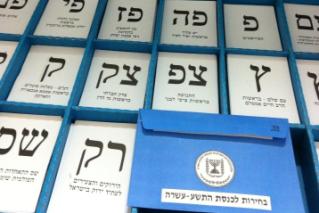 Photography: Tali Nir
Photography: Tali NirOn Sunday, December 28, an extended panel of nine Supreme Court Justices heard arguments on two petitions – submitted by Attorneys Yehuda Gutman and Eliyahu Mashulmi – against the law to raise the Knesset threshold. ACRI and Adalah requested to join the legal proceedings as friends of the court. The organizations argued that the decision to raise the electoral threshold was designed to suppress Arab representation in the Knesset.
The hearing raised important issues regarding the impact of the new threshold upon the political representation of Israel’s Arab minority and other minority groups in Israel. The hearing was heard by Court President Asher Gronis, Deputy-President Miriam Naor and Justices Rubenstein, Joubran, Hayut, Meler, Danziger, Hendel and Vogelman.
Justice Joubran noted during the hearing that the new threshold “forces the Arab sector to unite on one list. This is a problem. There are several ideologies and several worldviews.”
Justice Hayut pointed out that the law “raises difficulties and creates discomfort”.
Justice Rubenstein explained that “if we consider the history of Arab voting patterns, we see that almost all or two thirds of these parties would fail to pass the new threshold. ”
In contrast, Supreme Court President Grunis repeatedly asserted that any attempt to predict the impact of the new threshold on voter turnout and political representation is pure speculation.
ACRI Attorney Auni Banna clarified during the hearing that owing to the scenario that all Arab parties are forced to unite, this new threshold becomes an infringement on the Arab minority’s right to vote regardless of voter turnout.
Adalah Attorney Nadeem Shehadeh remarked that “according to the threshold prior to the law’s amendment, Arab parties needed to obtain 20% of the votes from all Arab citizens in order to enter the Knesset, but now, in accordance with the new law, they will need to get 30%. It is clear that this primarily harms Arab parties.”
The request by ACRI and Adalah to join the legal proceedings, submitted by ACRI Attorney Auni Banna and Adalah Attorney Nadeem Shehadeh, contended that the new threshold (which rose from 2% to 3.25%) rescinds the right to political representation for Arab voters. The Arab public consists of a broad variety of groups and opinions, all of whom are entitled to an opportunity for free choice, just like the Jewish majority. The submission further argued that the Knesset did not sufficiently consider the history of the electoral threshold in relation to Arab parties in previous election campaigns, and ignored the fact that all of the Arab political parties opposed the proposal. In contrast to the claims of the law’s sponsors, the new threshold in no way contributes to a more stable governance structure in Israel.
Related Information







